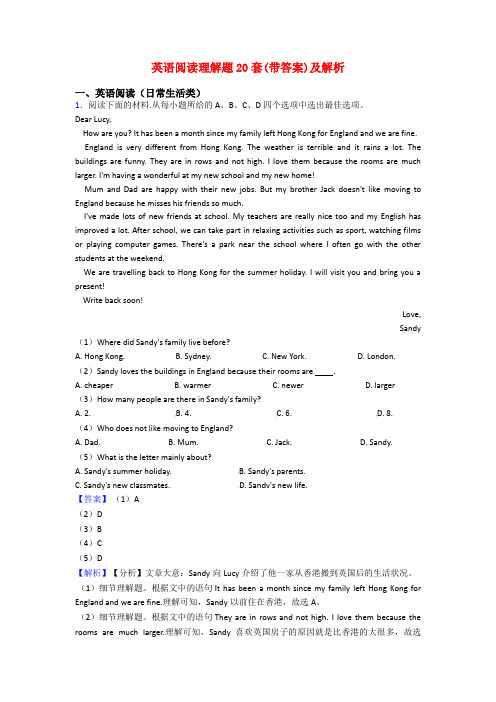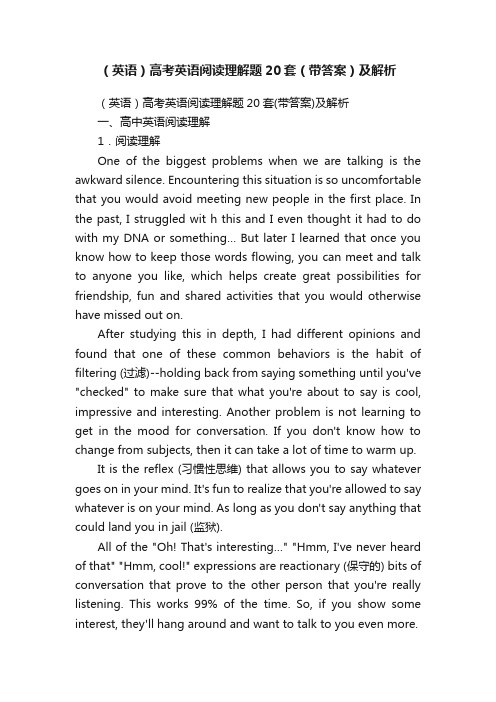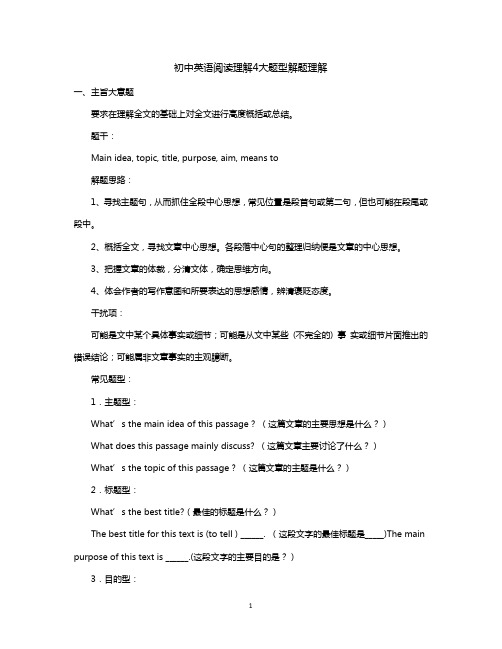英语阅读理解题型解析
英语阅读理解题20套(带答案)及解析

英语阅读理解题20套(带答案)及解析一、英语阅读(日常生活类)1.阅读下面的材料.从每小题所给的 A、B、C、D四个选项中选出最佳选项。
Dear Lucy,How are you? It has been a month since my family left Hong Kong for England and we are fine.England is very different from Hong Kong. The weather is terrible and it rains a lot. The buildings are funny. They are in rows and not high. I love them because the rooms are much larger. I'm having a wonderful at my new school and my new home!Mum and Dad are happy with their new jobs. But my brother Jack doesn't like moving to England because he misses his friends so much.I've made lots of new friends at school. My teachers are really nice too and my English has improved a lot. After school, we can take part in relaxing activities such as sport, watching films or playing computer games. There's a park near the school where I often go with the other students at the weekend.We are travelling back to Hong Kong for the summer holiday. I will visit you and bring you a present!Write back soon!Love,Sandy (1)Where did Sandy's family live before?A. Hong Kong.B. Sydney.C. New York.D. London.(2)Sandy loves the buildings in England because their rooms are .A. cheaperB. warmerC. newerD. larger(3)How many people are there in Sandy's family?A. 2.B. 4.C. 6.D. 8.(4)Who does not like moving to England?A. Dad.B. Mum.C. Jack.D. Sandy.(5)What is the letter mainly about?A. Sandy's summer holiday.B. Sandy's parents.C. Sandy's new classmates.D. Sandv's new life.【答案】(1)A(2)D(3)B(4)C(5)D【解析】【分析】文章大意:Sandy向Lucy介绍了他一家从香港搬到英国后的生活状况。
英语四级阅读常见题型解析

英语四级阅读常见题型解析阅读部分是英语四级考试中的一大难点,其中各种题型比较多,且难度较高。
本文将围绕英语四级阅读常见题型进行解析,并提供一些解题技巧和策略。
一、主旨大意题(Main Idea)主旨大意题是四级阅读中最常见的一种题型。
解答此类题目时,应首先阅读文章,了解文章的整体结构和内容,然后选出最贴切文章的中心思想的选项。
解题技巧:1. 根据文章首段和尾段可以确定文章的大致内容,再进行整体理解。
2.注意作者在文章中的态度和立场,帮助理解文章的主旨。
3.选项中有可能出现与文章内容相关但非主旨的细节信息,需切记将主旨与细节区分开。
二、细节理解题(Detail)细节理解题是要求考生根据文章的具体细节信息进行推断或判断。
解答此类题目时,应细致阅读文章,注意细节信息的表达。
解题技巧:1. 特征词法:通过寻找文章中的特定词语进行答案定位。
如人名、地名或数字等。
2. 同义替换法:答案选项中可能会进行同义替换,要善于发现并识别。
3. 注意否定词:答案中的否定词可能会反转原文的意义,需特别留意。
三、态度观点题(Attitude/Orientation)态度观点题考察考生对文章作者的立场和观点的理解。
解答此类题目时,要密切关注文章的语气和态度,推测作者对某个事物的看法。
解题技巧:1. 根据文章中的情感词语,如喜欢、讨厌、推崇、反对等,推断作者的立场。
2. 留意作者对细节的描述方式,以及对于相关事件的评价。
3. 注意文章的整体语气,比如讽刺、调侃或者正式、客观等。
四、词汇理解题(Vocabulary)词汇理解题要求考生根据上下文理解词汇的含义。
解答此类题目时,可以通过上下文的逻辑关系和常识进行推测。
解题技巧:1. 确定上下文的语境,了解词汇所处的环境,判断词汇意义。
2.分析词根、前缀、后缀等构词法线索,推测词汇含义。
3.当无法确定词汇具体含义时,可根据选项进行排除。
以上是英语四级阅读常见题型的解析和解题技巧。
通过充分理解不同题型的要求,掌握相应的解题方法,相信你能在考试中取得好成绩。
(英语)高考英语阅读理解题20套(带答案)及解析

(英语)高考英语阅读理解题20套(带答案)及解析(英语)高考英语阅读理解题20套(带答案)及解析一、高中英语阅读理解1.阅读理解One of the biggest problems when we are talking is the awkward silence. Encountering this situation is so uncomfortable that you would avoid meeting new people in the first place. In the past, I struggled wit h this and I even thought it had to do with my DNA or something… But later I learned that once you know how to keep those words flowing, you can meet and talk to anyone you like, which helps create great possibilities for friendship, fun and shared activities that you would otherwise have missed out on.After studying this in depth, I had different opinions and found that one of these common behaviors is the habit of filtering (过滤)--holding back from saying something until you've "checked" to make sure that what you're about to say is cool, impressive and interesting. Another problem is not learning to get in the mood for conversation. If you don't know how to change from subjects, then it can take a lot of time to warm up.It is the reflex (习惯性思维) that allows you to say whatever goes on in your mind. It's fun to realize that you're allowed to say whatever is on your mind. As long as you don't say anything that could land you in jail (监狱).All of the "Oh! That's interesting…" "Hmm, I've never heard of that" "Hmm, cool!" expressions are reactionary (保守的) bits of conversation that prove to the other person that you're really listening. This works 99% of the time. So, if you show some interest, they'll hang around and want to talk to you even more.Everyone knows that stories juice-up conversations, but most people only talk about stories of their own lives. When someone mentions something related to any of them, just tell the story, even if it's not from your life. The more interesting, stranger or more frightening they are, the harder they are to forget.(1)If people can deal with the awkward silence, they can .A. train their working skillB. improve their life qualityC. enrich their social lifeD. establish their working relationship(2)When talking with others, we should .A. feel nervousB. think twiceC. be free to expressD. avoid breaking in (3)According to the passage, what do the speakers care much about?A. The attractive topics of conversation.B. The atmosphere of the conversation.C. The listener's experiences and tastes.D. The listener's curiosity and concern.(4)What does the underlined part "juice-up conversations" mean?A. making conversations more boringB. making conversations livelierC. making conversations smootherD. making conversations more relaxing【答案】(1)C(2)C(3)D(4)B【解析】【分析】本文本文是一篇议论文,我们谈话时最大的问题之一是尴尬的沉默。
英语六级阅读理解常见题型解析

英语六级阅读理解常见题型解析英语六级阅读理解是考试中的一项重要内容,常见的题型有细节理解、主旨大意、推理判断、标题选择、词义猜测等。
本文将对这些题型进行详细解析,帮助大家提高解题能力。
一、细节理解题细节理解题要求考生根据文章中的具体细节信息进行判断。
常见的解题方法包括扫读法和精读法。
扫读法是指快速浏览全文,找出与题目相关的关键词或句子,然后进行定位查找;精读法是指仔细阅读相关段落,找出与题目相关的详细信息。
在解答细节理解题时,考生应注意字面意思和上下文的关联,以确保选择正确答案。
二、主旨大意题主旨大意题要求考生理解整篇文章的中心思想。
解答这类题型时,考生应注意排除干扰信息,抓住关键词和句子,总结文章的主题或中心论点。
有时,文章可能会有明显的主题句或关键词,考生可以根据这些线索找到正确答案。
此外,对于复杂的文章,考生可以通过段落归纳的方式,提炼出每个段落的主题,并最终推断出整篇文章的中心思想。
三、推理判断题推理判断题要求考生根据文章中的信息进行推断。
通常,这类题目会给出一些已知事实或观点,要求考生根据这些信息推断出一个结论。
解答这类题目时,考生需要进行逻辑思考,运用自己的推理能力。
关键是要在理解文章的基础上,灵活运用已知信息,做出准确的推断。
四、标题选择题标题选择题要求考生根据文章的内容选择一个最适合的标题。
解答这类题目时,考生需要理解文章的主题和结构,抓住关键词和句子,找出与题目相关的信息。
有时,题目可能会直接给出关键词或句子,作为选择的线索。
在选择标题时,注意选择与文章内容最相符的选项。
五、词义猜测题词义猜测题要求考生根据上下文推测生词的意思。
在解答这类题目时,考生应仔细阅读生词所在的句子和段落,分析上下文的逻辑关系,推测出生词的含义。
常见的上下文线索包括同义词、反义词、解释说明、具体例子等。
在进行词义猜测时,考生可以参考其他语境中类似的词语,或者根据个人经验进行推断。
综上所述,英语六级阅读理解题型包括细节理解、主旨大意、推理判断、标题选择和词义猜测等。
高中英语阅读理解题型有哪些?

高中英语阅读理解题型有哪些?高中英语阅读理解是英语学习中重要的组成部分,它不仅考查学生的词汇量、语法知识,更重要的是考察学生的逻辑思维能力、批判性思维能力,以及对文本的理解和分析能力。
本文将从教育专家的角度,对高中英语阅读理解的题型进行分类解析,并做出一些提高阅读理解能力的建议。
一、高中英语阅读理解题型分类高中英语阅读理解题型主要分为以下几类:1. 事实细节题(Factual Detail Questions):考察学生对文章中具体的信息、事实和事件的理解能力。
最常见的一种提问方式是:“According to the passage,…”“What does the passage say about…?”“Which of the following is mentioned in the passage?”2. 推理判断题(Inference Questions):考察学生根据文章内容进行推断和判断的能力。
常见提问包括:“What can be inferred from the passage?”“The author implies that…?”“The passage suggests that…?”3. 词汇解释题(Vocabulary Questions):考察学生对文中关键词语的理解能力,包括词义辨析、词语的语境含义等。
比较普遍的提问方式是:“The word ‘…’ in the passage means…?”“The author uses the word ‘…’ to refer to…?”4. 主旨大意题(Main Idea Questions):考察学生对文章核心内容的把握能力。
比较普遍的提问方式是:“What is the main idea of the passage?”“What is the author’s main purpose in writing this passage?”“The best title for this passage is…?”5. 作者态度/写作目的题(Author’s Attitude/Purpose Questions):考察学生对作者写作目的、态度和语气等的理解能力。
初中英语阅读理解4大题型解题理解

初中英语阅读理解4大题型解题理解一、主旨大意题要求在理解全文的基础上对全文进行高度概括或总结。
题干:Main idea, topic, title, purpose, aim, means to解题思路:1、寻找主题句,从而抓住全段中心思想,常见位置是段首句或第二句,但也可能在段尾或段中。
2、概括全文,寻找文章中心思想。
各段落中心句的整理归纳便是文章的中心思想。
3、把握文章的体裁,分清文体,确定思维方向。
4、体会作者的写作意图和所要表达的思想感情,辨清褒贬态度。
干扰项:可能是文中某个具体事实或细节;可能是从文中某些(不完全的) 事实或细节片面推出的错误结论;可能属非文章事实的主观臆断。
常见题型:1.主题型:What’s the main idea of this passage ? (这篇文章的主要思想是什么?)What does this passage mainly discuss? (这篇文章主要讨论了什么?)What’s the topic of this passage ? (这篇文章的主题是什么?)2.标题型:What’s the best title?(最佳的标题是什么?)The best title for this text is (to tell ) ______. (这段文字的最佳标题是_____)The main purpose of this text is ______.(这段文字的主要目的是?)3.目的型:The author’s purpose of writing this text is to______.(作者写这段文字的主要目的是?)What’s the main purpose of the passage?(这篇文章的主要目的是?)二、细节理解题做这种题目要注意注意提干中的标识语,带着问题有目的地寻找某一特定信息。
题干中的标识语就是寻找答案的"路标词",如人物/时间/地点等。
四级阅读题型详解
四级阅读题型详解阅读理解题是英语四级考试中常见的一种题型,也是考察学生阅读理解能力的重要手段。
本文将对四级阅读题型进行详细解析,帮助考生更好地应对这一题型。
一、主旨大意题主旨大意题要求理解整篇文章的中心思想,答题时需要综合考虑文章的主题、标题、段落主题句等关键信息。
一般来说,主题与标题的表达形式相似,但并不完全一致。
在解答这类题目时,需要注意以下几点:1. 确定文章类型:是叙述性、说明性还是议论性文章。
这有助于理解文章的整体结构和作者意图。
2. 关注开头和结尾:往往文章的开头会提到文章的中心思想,结尾也常常总结文章的主旨。
3. 重点段落:段落主题句通常包含了作者想表达的核心思想,重点留意这些句子。
二、细节理解题细节理解题是考察考生对文章细节信息的把握能力。
在回答这类题目时,要注意以下几点:1. 定位关键词:通过定位关键词可以快速找到相关信息,通常关键词出现在原文中的同义词或近义词、数字、人名地名等形式。
2. 注意修饰语:定位的关键词常常与修饰语一起出现,修饰语可以帮助理解关键词的具体含义。
3. 信息对应:在做题时要确保选项的信息与原文相对应,选项中可能会出现近义词、同义词、同类词等,需要进行准确的对应。
三、推理判断题推理判断题要求考生在阅读文章的基础上进行推理,从而得出与文章相符的结论。
在回答这类题目时,需要注意以下几点:1. 推理出处:推理判断题的答案需要在文中找到依据,理解文章的言外之意。
2. 注意修辞手法:作者常常会通过比喻、对比等修辞手法表达自己的观点,需要留意这些语言形式。
3. 排除干扰项:答案中可能会出现与文章不相关的干扰信息,需要排除这些错误选项。
四、态度观点题态度观点题考察考生对作者观点、立场的理解。
在解答这类题目时,要注意以下几点:1. 倾向性词汇:文中的倾向性词汇往往能够反映作者的观点和态度,关注这些词汇有助于理解作者立场。
2. 上下文信息:作者的观点和态度通常会在上下文中得到进一步的解释和论证,需要关注这些信息。
2023年全国新高考i卷的英语阅读理解解析
2023年全国新高考i卷的英语阅读理解解析一、概述2023年全国新高考i卷的英语阅读理解部分一直是考生备考的重点之一。
对于考生来说,了解并掌握这一部分的解题技巧及注意事项至关重要。
本篇文章将针对2023年全国新高考i卷的英语阅读理解部分展开解析,帮助考生更好地备战考试。
二、文章内容1. 阅读理解题型分类2023年全国新高考i卷的英语阅读理解部分题型大致分为主旨大意题、细节理解题、推理判断题等。
主旨大意题要求考生掌握文章的中心思想;细节理解题则需要考生从文章中获取具体信息;推理判断题则要求考生根据文章内容进行推理判断。
考生在备考过程中应熟悉各类题型的解题技巧,以便高效解题。
2. 解题思路及技巧针对主旨大意题,考生在阅读文章时应注意抓住文章的核心意思,避免被次要细节所迷惑,同时通过段落关系和语境来准确把握文章的主题。
对于细节理解题,考生应该在阅读过程中关注文章的重点信息,并且在做题时要注意文章中的指代关系,以免理解错误。
而在解推理判断题时,考生需门掌握文章的逻辑结构和作者的写作意图,以便准确进行推理。
3. 注意事项在解答阅读理解题时,考生需要注意以下几点:一是不要慌张,虽然时间紧迫,但考生应保持冷静,不要因为一道题耽误了整个题目;二是多读多练,通过多读文章,积累一定的阅读量,提高阅读理解能力;三是注重细节,有些题目可能会涉及到文章中的细小信息,考生需要在阅读时留意这些细节,以免在做题时无从下手。
三、结语2023年全国新高考i卷的英语阅读理解部分对考生的阅读和理解能力提出了挑战,但只要考生真正理解解题技巧及注意事项,并坚持练习,相信一定能在考试中取得好成绩。
希望本文的内容能为考生提供一些帮助,祝愿所有考生都能取得优异的成绩。
四、解题技巧的针对性分析针对不同类型的阅读理解题,考生应采取不同的解题思路和技巧。
对于主旨大意题,考生需要注意文章的核心信息,通常可以从文章的首尾段或者段落大意中找到答案。
强调句或者关键词汇也是寻找主旨大意的重要线索,因此解答此类题目时应当细读文章,并特别留意文章的中心思想。
高中英语考试中阅读理解的九大题型和解题技巧
高中英语考试中阅读理解的九大题型和解题技巧1.例证题:①例证题的标记。
当题干中出现example,case,illustrate,illustration,exemplify时。
②返回原文,找出该例证所在的位置,既给该例子定位。
③搜索该例证周围的区域,90%向上,10%向下,找出该例证支持的观点。
例子周围具有概括抽象性的表达通常就是它的论点。
注意:举例的目的是为了支持论点或是为了说明主题句。
举例后马上问这个例子说明了什么问题?不能用例子中的话来回答这个问题。
④找出该论点,并与四个选项比较,得出选项中与该论点最一致的答案。
⑤例证题错误答案设计的干扰特征经常是:就事论事。
即用例子中的某一内容拉出来让你去选。
(╳)要求:在阅读中,遇到长的例子,立即给这个例子定位,即找出起始点,从哪开始到哪结束。
2.指代题:①返回原文,找出出题的指代词。
②向上搜索,找最近的名词、名词性短语或句子(先从最近点开始找,找不到再找次近的,一般答案不会离得太远)。
③将找到的词、词组或句子的意思代入替换该指代词,看其意思是否通顺。
④将找到的词、词组或句子与四个选项进行比较,找出最佳答案。
3.词汇题:“搜索代入”法:①返回原文,找出该词汇出现的地方。
②确定该词汇的词性③从上下文(词汇的前后几句)中找到与所给词汇具有相同词性的词(如一下子找不到就再往上往下找),代入所给词汇在文章中的位置(将之替换)看语义是否合适④找出选项中与代替词意思相同或相近的选相,即答案4.句子理解题:①返回原文找到原句。
②对原句进行语法和词义的精确分析(找主干),应该重点抓原句的字面含义。
若该句的字面含义不能确定,则依据上下文进行判断。
注意:局部含义是由整体决定的。
③一般来说,选项中的正确答案与原句意思完全相同,只不过用其他英语词汇换种表达而已。
④句子理解题的错误选项干扰项特征:推得过远。
做题时应把握住推的度。
思路:对句子微观分析?不行就依据上下文?选择时不要推得过远。
高中英语知识点归纳阅读理解技巧和题型解析
高中英语知识点归纳阅读理解技巧和题型解析高中英语中的阅读理解是考察学生对文章的理解和推理能力的一种题型。
阅读理解题分为短文理解和长文阅读两种类型,题目形式包括选择题、填空题、判断题、配对题和主观题等。
为了提高阅读理解的能力,学生需要掌握一些技巧和了解常见的题型解析。
一、阅读理解的技巧1. 阅读前的准备在开始阅读之前,可以先浏览一下文章的标题和各个段落的开头句,了解文章的主题和结构,帮助我们快速抓住文章的重点和主旨。
2. 理解段落关键词在阅读文章时,可以找出关键词、关键短语和关键句子,帮助理解整个段落的主要内容。
可以通过标记关键词,或者用自己的话将关键内容概括出来,有助于记忆和理解。
3. 掌握词汇技巧阅读理解中会出现很多生词和短语,掌握词汇技巧可以帮助我们更好地理解文章。
比如,通过上下文的暗示推测词义,利用词根、前缀、后缀等等来猜测意思。
4. 注意文章的结构文章中的信息往往是有组织结构的,理解文章的结构有助于把握全文的主题和发展过程。
可以注意段落之间的连接词,如firstly, secondly, finally等等,以及主题句和补充说明句之间的关系。
二、常见题型解析1. 选择题选择题是最常见的题型,要求从给定的选项中选择最佳答案。
解答选择题时,可以通过排除法来确定答案,先排除明显错误的选项,再从剩下的选项中选出最合适的答案。
2. 填空题填空题要求根据文章内容,填写空缺的单词或短语。
解答填空题时,可以通过上下文的逻辑关系来推测答案,注意其中的提示词或相关词语。
3. 判断题判断题要求根据文章内容,判断给定的陈述是否正确。
解答判断题时,需要仔细阅读文章,注意文章中的细节信息,判断是否与陈述相符。
4. 配对题配对题要求将文章中的某些特定信息与相应的解释、人物或事物进行配对。
解答配对题时,需要仔细阅读文章,根据信息的关系将其正确地进行配对。
5. 主观题主观题要求学生根据自己的理解和思考,进行综合性的回答。
- 1、下载文档前请自行甄别文档内容的完整性,平台不提供额外的编辑、内容补充、找答案等附加服务。
- 2、"仅部分预览"的文档,不可在线预览部分如存在完整性等问题,可反馈申请退款(可完整预览的文档不适用该条件!)。
- 3、如文档侵犯您的权益,请联系客服反馈,我们会尽快为您处理(人工客服工作时间:9:00-18:30)。
阅读理解主要在阅读速度和提取梳理信息的准度,需要平时英语阅读的限时练习。
题型分析:主旨大意题,细节理解题,推理判断题(含写作意图、目的等),词义猜测题。
一、主旨大意题1.归纳标题特点:短小精悍;涵盖性强。
精确性强,表达范围要恰当,不能随意改变语意程度或色彩。
2.概括大意题包括段落大意和文章中心思想解题技巧对于议论文和说明文,这两种文体的结构可归纳为::提出问题一-论述问题--得出结论或者阐明观点。
关键:抓主题句主题句的位置:(1)文章的开头或结尾。
主题句具有简洁性、概括性的特点。
段首:看首句与第二,三句的关系;如从第二句就开始对第一句进行说明,论述或描述。
那第一句就是主题句。
注意主题句后面一般有明显引出细节的信号词如for example, an example of; first, second, next, last, finally; to begin with, also, besides; one, the other; some, others等。
如果已经能够理解主题句,那么这些词后的内容可以略看,如果不理解主题句,后面的内容则可帮忙理解主题句。
段尾:开头列举事实,最后论证作者的核心论点。
因此,如果第一-句话不是综合性的话,可先快速读一读段落的最后-个句子,看看它是否为主题句。
但-般,当一种观点不易向人解释清楚或不易被人接受时,主题句才会在末尾出现,所以前面的内容也不能忽略。
结尾主题句信号词。
像so,therefore,thus,consequently; in conclusion,in short; in a word, to sum up这种表表总结性的词。
当无明显的此类信号时,可在段落的最后一句话前面添加一个引出结论的信号词,以确定其是否是主题句。
段中:先介绍背景和细节,接着用一句综合性的话概括前面所说的内容或事例,然后再围绕主题展开对有关问题的深入讨论。
一般结构为:先提出问题,然后给予回答(主题句),最后进行解释。
首尾呼应:主题句可能会在段落的开头和结尾两个位置上都先后出现,形成前呼后应的格局。
此时这两个句子并非简单重复,后一个主题句或对该主题作最后的评述,或对要点概括,可以引申思考。
【找主题句也是快速理解段意,文意的有效方法】无明确主题句:找关键词(出现频率较高) , 归纳总结。
注意主旨题题型的干扰项有,(1) 表述过于片面,只涵盖该段个别细节;或描述文章中的具体细节(2)表述太过于笼统,已超出该段的内容;(3)表述与段落内容无关,在段落中找不到相关依据二、细节理解题:涉及时间、地点、人物、事件、原因、结果、数字等议论文中例证细节和定义类细节。
这类题:答案一-般都能在文章中找到。
但并不- -定是文章中的原句,很多需要是同义代换。
1.事实细节题→寻读法直接型和间接型,直接型如who, what, which, when, where, why和how提问,或判断正误;间接型需与原文信息转换,表达上与原文有差异。
如What can we learn from the passage?AlI the following are mentioned except?Which of the following is mentioned (not mentioned)?2.排序题≥首尾定位法(找出第-个事件和最后一个事件,用排除法缩小范围)常出现在记叙文和说明文中,-般按事件发生的顺序。
如问:Which of the following is the correct order ?3.数字计算题→(方法:审题→带着问题找细节→对比、分析、计算)可直接找到相关细节,但需经过计算方可找到答案。
三、推理判断题对文章中隐含或深层的含意的理解,需要根据文章内容做出合乎逻辑的推断,注意对作者观点的理解,题设:infer(推断), indicate(象征,暗示), imply/suggest(暗示), conclude, assume(假定,设想).1.细节推理判断题可根据短文提供的信息或借助生活常识进行推理判断,常见命题形式有:It can be inferred/ concluded from the text that.The author implies/ suggests that.2.预测推理判断题根据语篇对文章接下来的内容或可能的结局进行猜测,常见命题形式有:At the end of this passage, the writer might continue to write_____3.推测文章来源或读者对象:The passage is probably take out of_Where does this text probably come from?4.写作意图、目的、态度推断题作者的语气态度往往不会直接写在文章里,要通过细读文章,从作者的选词及其修饰手段中体会。
询问写作目的的题,选项里常出现的词有: explain(解释), prove (证明), persuade(劝说), advise(劝告), comment(评论), praise(赞扬),criticize(批评), entertain(娱乐), demonstrate(举例说明), argue(辩论),tell(讲述), analyze(分析)等。
询问语气态度的题,选项里常出现的词是: neutral( 中立的),sympathetic(同情的), satisfied(满意的), friendly(友好的),enthusiastic(热情的), subjective(主观的), objective(客观的), matter-of-fact(实事求是的), pessimisti(悲观的), optimistic(乐观的),critical(批评的), doubtful(怀疑的), hostile(敌对的), indifferent(冷淡的),disappointed(失望的)。
【这些单词一定要认识。
】题设有:The purpose of the text is…What is the main purpose of the author writing the text?By mentioning_.. the author aims to show that_The author's tone in this passage is解答技巧推断题是要透过文章表面的文字信息进行分析,必须以事实为依据,切莫主观臆断。
①文章中直接陈述的内容不能选,要选择根据文章推理出来的选项。
②)推理不是凭空猜测,而是立足已知推断未知;作出正确答案时一定要在文中找到依据③要忠实于原文,以文章提供的事实和线索为依据。
不能以自己的观点代替作者的想法,不要脱离原文主观臆断。
四、词义猜测题题设:①猜测某个词、词组、句子的意义②对文中的多义词或词组进行定义③判断某个代词的指代的对象。
常见命题形式有:The underlined word/phrase in the second paragraph means,The word "it/they" in the last sentence refers to_The word“..”. (Line 6. para.2) probably meansWhich of the following is closest in meaning to the word“..”?解答技巧1.通过因果关系猜词首先是找出生词与上下文之间的逻辑关系,然后才能猜词。
文章会借助关联词(如because, as, since, for, so, thus,as a result, of course, therefore等等)表示前因后果。
例如: You shouldn't have blamed him for that, for it wasn't his fault.通过for引出的句子所表示的原因(那不是他的错),可猜出blame的词义是"责备"。
2.通过同义词和反义词的关系猜词通过同义词猜词,一是要看由and或or连接的同义词词组,如happy and gay,即使我们不认识gay这个词,也可以知道它是愉快的意思;二是看在进一-步解释的过程中使用的同义词,如Man has known something about the planets Venus. Mars,and Jupiter with the help of spaceships.此句中的Venus(金星)、Mars(火星)、Jupiter(木星)均为生词,但只要知道planets就可猜出这几个词都属于"行星"这一义域。
通过反义词猜词,-是看表转折关系的连词或副词,如but, while, however等;二是看与not搭配的或表示否定意义的词语,如: He is so homely, not at all as handsome as his brother.根据not at all as..handsome可推测出homely,即不英俊、不漂亮的意思。
3.通过构词法猜词前缀、后缀、复合、派生等构词知识判断生词词义。
4.通过定义或释义关系来推测词义例如: But sometimes,no rain falls for a long,long time. Then there is a dry period, or drought.从drought所在句子的.上文我们得知很久不下雨,于是便有一段干旱的时期,即drought, 意思为"久旱",”旱灾"。
而a dry period和drought是同义语。
这种同义或释义关系常由is,or, that is, in other words, be called或破折号等来表示。
5.通过句法功能来推测词义例如: Bananas,oranges, pineapples, coconuts and some other kind of fruit grow in warm areas.假如pineapples和coconuts是生词,我们可以从这两个词在句中所处的位置来判断它们大致的意思。
从中可知pineapples, coconuts和bananas, oranges是同类关系,同属fruit类,因此它们是两样水果,准确地说,是菠萝和椰子。
6.通过描述猜词描述即作者对该人或该物作出的外在相貌或内在特征的描写。
例如:The penguin is a kind of sea bird living in the South Pole. It is fat and walks in a funny way. Although it cannot fly, it can swim in the icy water to catch the fish.从例句的描述中可以得知penguin是一种生活在南极的鸟类。
